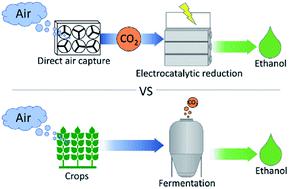当前位置:
X-MOL 学术
›
Sustain. Energy Fuels
›
论文详情
Our official English website, www.x-mol.net, welcomes your
feedback! (Note: you will need to create a separate account there.)
How sustainable is CO2 conversion to ethanol? – A life cycle assessment of a new electrocatalytic carbon utilisation process
Sustainable Energy & Fuels ( IF 5.0 ) Pub Date : 2021-10-05 , DOI: 10.1039/d1se01462e Daniel Rojas Sánchez 1 , Kaveh Khalilpour 2 , Andrew F. A. Hoadley 1
Sustainable Energy & Fuels ( IF 5.0 ) Pub Date : 2021-10-05 , DOI: 10.1039/d1se01462e Daniel Rojas Sánchez 1 , Kaveh Khalilpour 2 , Andrew F. A. Hoadley 1
Affiliation

|
Although bioethanol production is considered to be sustainable from a global warming perspective, its dependence on agricultural systems, land management, and geographical limitations has sparked concern. The electrocatalytic CO2 reduction reaction (CO2RR) is a promising alternative pathway to produce fuels, such as ethanol, through captured CO2 and electricity. The CO2RR has been studied exhaustively in the literature, but the potential environmental impacts of producing ethanol in a practical process on a large scale are unknown. In this paper, we perform a life cycle assessment to quantify the potential environmental benefits of ethanol production via a proposed electrocatalytic captured CO2 reduction (ECCR) system coupled with an innovative product separation design at a commercially relevant scale. The production of bioethanol via grain fermentation was used as the reference in the comparison of nine environmental impact categories. Results indicate that ethanol via ECCR has a lower or comparable associated impact in all examined environmental categories, depending on the nature of the energy supplied to the system. Specifically for global warming, the ECCR becomes competitive against the reference when the electricity supplied has a carbon intensity lower than 63 gCO2eq per kW h. Overall, the proposed ECCR system is a modular and versatile alternative that presents a clear advantage on land use and water consumption. This early-stage technology has the capability of producing ethanol sustainably whilst offering the associated benefits of a carbon capture and utilisation pathway.
中文翻译:

CO2 转化为乙醇的可持续性如何?– 一种新的电催化碳利用过程的生命周期评估
尽管从全球变暖的角度来看,生物乙醇生产被认为是可持续的,但它对农业系统、土地管理和地理限制的依赖引起了人们的关注。电催化CO 2还原反应 (CO 2 RR) 是一种很有前景的替代途径,可以通过捕获的 CO 2和电力生产乙醇等燃料。文献中对 CO 2 RR 进行了详尽的研究,但在实际过程中大规模生产乙醇的潜在环境影响尚不清楚。在本文中,我们进行了生命周期评估,以通过拟议的电催化捕获 CO 2来量化乙醇生产的潜在环境效益减少 (ECCR) 系统与商业相关规模的创新产品分离设计相结合。通过谷物发酵生产生物乙醇作为比较九个环境影响类别的参考。结果表明,根据供应给系统的能源的性质,通过ECCR 的乙醇在所有检查的环境类别中具有较低或相当的相关影响。特别是对于全球变暖,当供应的电力的碳强度低于 63 gCO 2时,ECCR 变得与参考相比具有竞争力每千瓦时当量。总体而言,拟议的 ECCR 系统是一种模块化和多功能的替代方案,在土地使用和用水方面具有明显的优势。这种早期技术具有可持续生产乙醇的能力,同时提供碳捕获和利用途径的相关好处。
更新日期:2021-10-29
中文翻译:

CO2 转化为乙醇的可持续性如何?– 一种新的电催化碳利用过程的生命周期评估
尽管从全球变暖的角度来看,生物乙醇生产被认为是可持续的,但它对农业系统、土地管理和地理限制的依赖引起了人们的关注。电催化CO 2还原反应 (CO 2 RR) 是一种很有前景的替代途径,可以通过捕获的 CO 2和电力生产乙醇等燃料。文献中对 CO 2 RR 进行了详尽的研究,但在实际过程中大规模生产乙醇的潜在环境影响尚不清楚。在本文中,我们进行了生命周期评估,以通过拟议的电催化捕获 CO 2来量化乙醇生产的潜在环境效益减少 (ECCR) 系统与商业相关规模的创新产品分离设计相结合。通过谷物发酵生产生物乙醇作为比较九个环境影响类别的参考。结果表明,根据供应给系统的能源的性质,通过ECCR 的乙醇在所有检查的环境类别中具有较低或相当的相关影响。特别是对于全球变暖,当供应的电力的碳强度低于 63 gCO 2时,ECCR 变得与参考相比具有竞争力每千瓦时当量。总体而言,拟议的 ECCR 系统是一种模块化和多功能的替代方案,在土地使用和用水方面具有明显的优势。这种早期技术具有可持续生产乙醇的能力,同时提供碳捕获和利用途径的相关好处。





















































 京公网安备 11010802027423号
京公网安备 11010802027423号